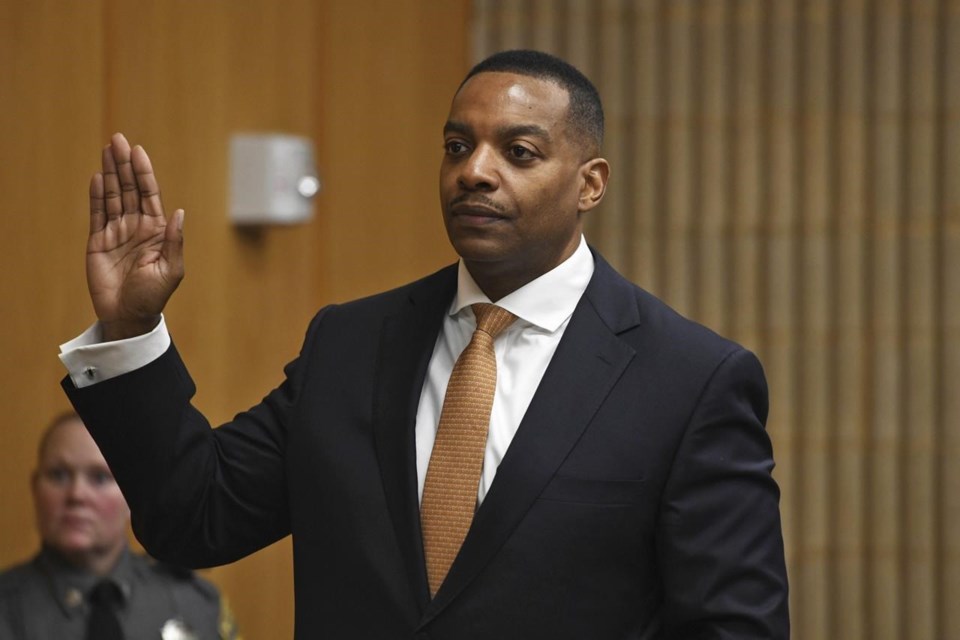A Connecticut state trooper's fatal shooting of the 19-year-old man who had just crashed a stolen car following a high-speed chase was “overkill” and showed an “extreme indifference to human life,” a prosecutor told jurors Wednesday during closing arguments at the trooper's manslaughter trial.
Officers had Mubarak Soulemane surrounded in the car following the Jan. 15, 2020, crash in West Haven and Trooper Brian North didn't need to shoot into the vehicle, killing him, state Inspector General Robert Devlin told the Milford court.
North's lead attorney, Frank Riccio II, asked the six jurors to acquit his client, arguing that North believed Soulemane was about to attack two other officers with a knife when he opened fire. Those other officers testified that they were worried Soulemane might harm them, he pointed out.
“If they felt as though they were in fear of death or serious physical injury, how is it not reasonable to think that Trooper North thought that way as well?” Riccio asked.
The jury began deliberations but did not reach a verdict by the end of Wednesday, the trial's eighth day. If convicted of first-degree manslaughter with a firearm, North could get from five to 40 years in prison. Deliberations were to resume Thursday morning.
On the day of the killing, North, Trooper Joshua Jackson and a West Haven police officer surrounded the stolen car after it left Interstate 95 during a chase and crashed into another vehicle. The police officer broke the passenger side window, and Jackson fired his Taser at Soulemane, but it didn’t subdue him.
North, who pleaded not guilty, fired his handgun seven times through the driver’s window at close range when he said Soulemane pulled out a knife and made a motion toward the other officers. The shooting happened about 35 seconds after North got out of his cruiser following the crash.
Devlin, who investigates all deadly uses of force by Connecticut police officers and found that the shooting wasn't justified, told the jury that officers had the car surrounded and Soulemane could not go anywhere. He said Soulemane was sitting in the driver's seat with a knife, but was not an imminent threat to police.
“What caused it was Brian North’s extreme indifference to human life," Devlin said about Soulemane's death. "We’ve had too many excuses, too many rationalizations. This young man is dead and he shouldn't be dead. That’s the bottom line here.”
He added, “Why is he dead? Because he stuck a stupid knife up in front of his face and Brian North jumped the gun and shot him seven times. He was a scared kid doing a stupid thing and he should still be alive today.”
Riccio, though, said North believed Soulemane was about to attack the other officers and was defending them when he opened fire.
“We’re taking an event that happened in real time and we’re being asked, everyone’s being asked, to critique what should have happened, what could have happened, what maybe should have been the result,” Riccio said. “That’s not what this is about. This is about what happened and what did Trooper North know.
“He thinks about this every day,” he continued. “This is a terrible event. Someone lost their life. But the question is, is Trooper North criminally responsible for that? He is not.”
Soulemane’s mother and sister testified that he struggled with schizophrenia and bipolar disorder, and that he didn't always take his medication.
On the day of the shooting, Soulemane displayed a knife at an AT&T store in Norwalk and unsuccessfully tried to steal a cellphone, according to police. He then slapped a Lyft driver and drove off in the driver’s car after the driver got out, leading police on a 30-mile (48-kilometer) chase from Norwalk to West Haven at speeds that reached up to 100 mph (161 kph) during the afternoon rush.
The local NAACP and clergy decried the shooting as another unnecessary killing of a Black man by police, but race was not raised as an issue at the trial. They and Soulemane's family criticized law enforcement for not trying to de-escalate the situation.
Dave Collins, The Associated Press


